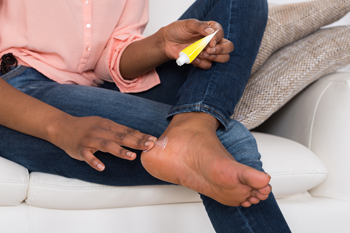Connect With Us
Blog
 Plantar fasciitis is an extremely common affliction of the foot. It affects the plantar fascia, which is the band of tissue that is found along the sole of the foot. Plantar fasciitis may develop when the plantar fascia becomes irritated and inflamed. This painful foot condition can be caused by many sports and strenuous physical activities, such as soccer. Since soccer requires an athlete to engage in frequent sideways and diagonal cuts while running, extra pressure is exerted on the feet. In particular, the medial heel and arch are subject to a significant amount of force in American soccer players. The risk of plantar fasciitis may be even more pronounced in substitute soccer players who, after initially warming up their bodies, wait on the sidelines for long periods of time. This may cause their muscles to tighten up before playing again and can make an individual more susceptible to plantar fasciitis. If you are a soccer player, it is suggested that you contact a podiatrist who will be able to provide you with the treatment for plantar fasciitis.
Plantar fasciitis is an extremely common affliction of the foot. It affects the plantar fascia, which is the band of tissue that is found along the sole of the foot. Plantar fasciitis may develop when the plantar fascia becomes irritated and inflamed. This painful foot condition can be caused by many sports and strenuous physical activities, such as soccer. Since soccer requires an athlete to engage in frequent sideways and diagonal cuts while running, extra pressure is exerted on the feet. In particular, the medial heel and arch are subject to a significant amount of force in American soccer players. The risk of plantar fasciitis may be even more pronounced in substitute soccer players who, after initially warming up their bodies, wait on the sidelines for long periods of time. This may cause their muscles to tighten up before playing again and can make an individual more susceptible to plantar fasciitis. If you are a soccer player, it is suggested that you contact a podiatrist who will be able to provide you with the treatment for plantar fasciitis.
Plantar fasciitis can be very painful and inconvenient. If you are experiencing heel pain or symptoms of plantar fasciitis, contact Dr. Yeon A. Shim from Roselle Podiatry Group. Our doctor can provide the care you need to keep you pain-free and on your feet.
What Is Plantar Fasciitis?
Plantar fasciitis is the inflammation of the thick band of tissue that runs along the bottom of your foot, known as the plantar fascia, and causes mild to severe heel pain.
What Causes Plantar Fasciitis?
- Excessive running
- Non-supportive shoes
- Overpronation
- Repeated stretching and tearing of the plantar fascia
How Can It Be Treated?
- Conservative measures – anti-inflammatories, ice packs, stretching exercises, physical therapy, orthotic devices
- Shockwave therapy – sound waves are sent to the affected area to facilitate healing and are usually used for chronic cases of plantar fasciitis
- Surgery – usually only used as a last resort when all else fails. The plantar fascia can be surgically detached from the heel
While very treatable, plantar fasciitis is definitely not something that should be ignored. Especially in severe cases, speaking to your doctor right away is highly recommended to avoid complications and severe heel pain. Your podiatrist can work with you to provide the appropriate treatment options tailored to your condition.
If you have any questions please feel free to contact our office located in Roselle, NJ . We offer the newest diagnostic and treatment technologies for all your foot and ankle needs.

While skateboarding can be a fun activity, it can also be hard on the feet and cause foot pain. Among other things, reasons for this might include that shoes are too tight, flat feet that can cause arch and heel pain, or jumping, landing, or doing skateboarding tricks can cause foot or ankle fractures. Ways to prevent foot pain while skateboarding start with wearing skate shoes that are properly fitted and supportive footwear. Wearing protective gear that pads joints, stretching and warming up muscles before beginning the activity, and improving technique are also ways to prevent foot pain. If you would like more information about protecting your feet and ankles while skateboarding, or if you have injured yourself in this activity, it is suggested that you see a podiatrist for advice or treatment.
Ankle and foot injuries are common among athletes and in many sports. They can be caused by several problems and may be potentially serious. If you are feeling pain or think you were injured in a sporting event or when exercising, consult with Dr. Yeon A. Shim from Roselle Podiatry Group. Our doctor will assess your condition and provide you with quality foot and ankle treatment.
Common Injuries
The most common injuries that occur in sporting activities include:
- Achilles Tendonitis
- Achilles Tendon Rupture
- Ankle Sprains
- Broken Foot
- Plantar Fasciitis
- Stress Fractures
- Turf Toe
Symptoms
Symptoms vary depending upon the injury and in some cases, there may be no symptoms at all. However, in most cases, some form of symptom is experienced. Pain, aching, burning, bruising, tenderness, tightness or stiffness, sensation loss, difficulty moving, and swelling are the most common symptoms.
Treatment
Just as symptoms vary depending upon the injury, so do treatment options. A common treatment method is known as the RICE method. This method involves rest, applying ice, compression and elevating the afflicted foot or ankle. If the injury appears to be more serious, surgery might be required, such as arthroscopic or reconstructive surgery. Lastly, rehabilitation or therapy might be needed to gain full functionality in the afflicted area. Any discomfort experienced by an athlete must be evaluated by a licensed, reputable medical professional.
If you have any questions, please feel free to contact our office located in Roselle, NJ . We offer the newest diagnostic and treatment technologies for all your foot care needs.

Cracked heels are an unsightly condition of the foot where excessive dehydration causes the skin at the back of the heel to become severely dry. As a result, the skin at the back of the heel may crack or fissure. Sometimes, an individual with a bad case of cracked heels might notice that their heels look dirty. This might be because dirt or debris can get trapped between the skin cracks. When the dirt builds up, this can give the appearance of gray lines on the back of the heels. If you are suffering from cracked heels, then it is suggested that you schedule an appointment with a podiatrist. This foot health specialist will be able to treat your condition and answer any questions that you might have about dirt building up in cracked heels.
Cracked heels are unsightly and can cause further damage to your shoes and feet. If you have any concerns, contact Dr. Yeon A. Shim from Roselle Podiatry Group. Our doctor can provide the care you need to keep you pain-free and on your feet.
Cracked Heels
Cracked heels appear unappealing and can make it harder for you walk around in sandals. Aside from looking unpleasant, cracked heels can also tear stockings, socks, and wear out your shoes. There are several methods to help restore a cracked heel and prevent further damage.
How Do You Get Them?
Dry skin is the number one culprit in creating cracked heels. Many athletes, walkers, joggers, and even swimmers suffer from cracked heels. Age and skin oil production play a role to getting cracked heels as well.
Promote Healing
Over the counter medicines can help, especially for those that need instant relief or who suffer from chronic dry feet.
Wear Socks – Wearing socks with medicated creams helps lock in moisture.
Moisturizers – Applying both day and night will help alleviate dryness which causes cracking.
Pumice Stones – These exfoliate and remove dead skin, which allows for smoother moisturizer application and better absorption into the skin.
Change in Diet
Eating healthy with a well-balanced diet will give the skin a fresh and radiant look. Your body responds to the kinds of food you ingest. Omega-3 fatty acids and zinc supplements can also revitalize skin tissue.
Most importantly, seek professional help if unsure how to proceed in treating cracked heels. A podiatrist will help you with any questions or information needed.
If you have any questions, please feel free to contact our office located in Roselle, NJ . We offer the newest diagnostic and treatment technologies for all your foot care needs.

